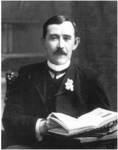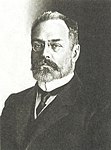First State Duma
|
|
||||||||||||||||||||||||||||||||||||||||
|---|---|---|---|---|---|---|---|---|---|---|---|---|---|---|---|---|---|---|---|---|---|---|---|---|---|---|---|---|---|---|---|---|---|---|---|---|---|---|---|---|
|
||||||||||||||||||||||||||||||||||||||||
|
All 478 seats to the State Duma of the Russian Empire |
||||||||||||||||||||||||||||||||||||||||
|
||||||||||||||||||||||||||||||||||||||||
|
||||||||||||||||||||||||||||||||||||||||
Sergey Muromtsev
Constitutional Democratic Party
Legislative elections were held in the Russian Empire from 26 March 1906 till 20 April. At stake were the 478 seats in the State Duma of the Russian Empire, the legislative assembly. Election for the First State Duma, which only ran from 27 April to 21 July 1906, returned a significant bloc of moderate socialists and two liberal parties which demanded further reforms. For this reason, it is sometimes called the Duma of Public Anger (Дума народного гнева).
The State Duma was created in a wave of violent attacks against imperial officials and public upheaval, which culminated in a national strike in October 1905 known as Russian Revolution of 1905, paving the way for Russia's first parliament. With the nation's infrastructure all but paralyzed, Tsar Nicholas II signed a historic manifesto of 17 October 1905, promising civil rights to the population and creating Russia's first parliament.
The electoral laws were promulgated in December 1905 and introduced franchise to male citizens over 25 years of age, and electing through four electoral colleges. The elections were therefore not universal as they excluded women, soldiers, and officers. Nor were they equal since the constituencies differed greatly in size.
The general elections to the State Duma took place in March 1906 and were boycotted by the some socialist groups and the Bolsheviks. Among the political parties formed were the peasant leaders' Labour Group (Trudoviks), liberal-intelligentsia Constitutional Democratic party (the Kadets), the less liberal Union of October 17 (the Octobrists), and the positively reactionary Union of Land-Owners.
In April 1906, only weeks after the election, the Sergei Witte's Cabinet issued the Basic Law of 1906, setting the limits of this new political order. The Tsar was confirmed as absolute leader, with complete control of the executive, foreign policy, church, and the armed forces. The State Duma was shifted, becoming a lower chamber below the reformed State Council of Imperial Russia, which had been the Russian legislative body since 1810. Legislation had to be approved by the Duma, the Council and the Emperor to become law - and in "exceptional conditions" the government could bypass the Duma. The Basic Law introduced a special provision, Article 87, which allowed the government to ex officio issue new legislation during breaks between sessions of the State Duma. Later on, Tsar Nicholas II would frequently use this provision in order to carry out the laws that had not been supported by the State Duma.
...
Wikipedia





